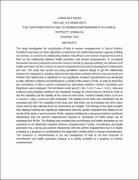| dc.description.abstract | The study investigated the contribution of Iida to women empowerment in Guri-el districtSomalia.It was based on three objectives; to determine the relationship between capacity building and women; to examine the relationship between microfinance and women empowerment and to find out the relationship between health promotion and women empowerment. A conceptual framework has been proposed to show the construct of Iida by capacity building, microfinance and health promotion and the construct of women empowerment by women development, employment and care. The study was carried out using correlation research design to get the relationship between the independent variables (Iida) and the dependent variables (Women empowerment) and whether that relationship is significant or non-significant. Research questionnaire was developed as data collection methods and distributed to a sample of 80 workers of Iida. In order to determine the contribution of Iida to women empowerment, descriptive statistics, Pearson Correlation and Regression were employed. The correlation result was [r²=.996, N 80, P value ≤ 0.01]. Data was analyzed using Stepwise method in the Statistical Package for Social Science (SPSS).In order to test the reliability and the validity of the research instruments, Content Validity Index (CVI) and Cronbach’s Alpha coefficient were employed. The validity of the study was 0.923which can be translated into 92%.The reliability of the study was .948 which can be translated into 95% which shows that the data collected from the respondents are reliable. The findings of the study revealed that capacity building has significant relationship with the women empowerment. Based on the results of the study, it was found that, firstly, capacity building has a strong and positive significant relationship with the women empowerment because it contributes [r²=.996] which can be translated into 99.6%. The findings also revealed that microfinance and health promotion do not contribute to the dependent variables (Women empowerment). Finally, microfinance and health promotion has a strong and positive relationship with the women empowerment but it is totally excluded as a predictor in contributing to the dependent variable which is women empowerment. The researcher is recommending to the top management of Iida to not lose resources to microfinance and health promotion because it is totally excluded as a predictor to women empowerment. | en_US |

